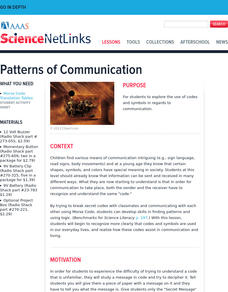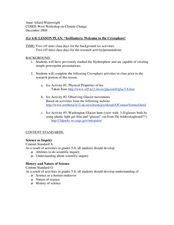Curated OER
Water Pressure Experiments
Young scholars perform experiments measuring water pressure. They record their observations after poking holes in plastic bottles filled with water with the lids on and then off. They discover the role gravity plays in the water flow.
Curated OER
Sorting
Students understand that sorting helps find things at a later date. In this sorting lesson, students use a website game and sort the common items. Students sort folders and other classroom items. Students discuss how sorting helped them...
Curated OER
Snack Attack: Food Packaging Activity
Students design and create packaging material for food. In this snack attack lesson, students design a package to protect a food item from heat and water. Students consider costs of materials, design, and test the package to see if it is...
Curated OER
Max Planck Study Questions
In this online interactive history worksheet, students respond to 10 short answer and essay questions about the accomplishments of Max Plank. Students may check some of their answers on the interactive worksheet.
Curated OER
Fieldwork: Horizons Under Ground: Digging Through Wetland Soil
Students study the different soil types and describe the different soils in various environments. In this soil instructional activity students walk to a reserve and discuss what they saw.
Curated OER
A Sense of West Virginia
Students consider their perceptions of the world through their 5 senses while visiting the West Virginia State Museum. In this West Virginia history lesson plan, students discover how knowing about the past helps with their understanding...
Curated OER
Design Your Own Rube Goldberg Machine
Students participate in a culminating activity for a unit on Energy and Simple Machines. They are challenged to incorporate simple machines in to a complex mechanical system. While designing and testing their machine they will also...
Curated OER
Global Warming: Life in a Greenhouse
Students examine the evidence that scientists have used to support the existence of global warming and the greenhouse effect. How the concepts have been developed and evaluated form the focus of this instructional activity.
Curated OER
Tornadoes
Students examine the characteristics of a tornado. They practice using new vocabulary and participate in a question and answer session. They use the internet to gather more specific information.
Curated OER
Naturral Born Robots: Robots Have Feelings Too
Students explore robotics. They design a simple device that simulates a human arm lifting a mass. Students test the strength of their arm. Students discuss artificial intelligence.
Curated OER
Boomerangs Keep Coming Back
Students investigate the flight of paper boomerangs. In this flight lesson, students examine the flight variables of paper boomerangs, which they make, by investigating the concepts of lift and drag. They examine what happens when an...
Curated OER
IceHunters: Welcome to the Cryosphere!
Students complete an online exploration mission assigned by their teacher. In this ecology lesson, students write a newspaper article about their polar mission following certain criteria. They create a PowerPoint presentation that they...
Curated OER
Finding the Ages of Rocks and Fossils
Students practice dating fossils. They learn the concept of "deep time"--that earth was formed billions of years ago. They experience excellent hand-outs and virtual age tutorial links.
Curated OER
Introducing Biodiversity
Young scholars identify the basic components necessary for biodiversity, the critical and countless benefits of habitats, as well as the serious present and future threats to their ongoing existence.
Curated OER
Rocks, Minerals, and Erosion
Fourth graders describe the difference between minerals (composed of the same substance throughout) and rocks (composed of two or more minerals). They recognize that there are three classes of rocks: igneous, sedimentary, and metamorphic
Curated OER
Bugs
Students participate in an after school program that promotes communications skills, hypothesizing, exploring, recording of data, leadership roles and making comparisons. They explore the world of insects, where they come from, how they...
Curated OER
Dinosaurs 1: Where Are the Dinosaurs?
Young scholars study dinosaurs. In this dinosaur lesson, students watch a web based video about dinosaurs before discussing what they liked about the dinosaurs, telling about the sounds they heard, and explaining what the Earth looked...
Curated OER
Water Resource Engineering
Learners examine solubility and the significance of water. In this aqueous solution lesson students complete a lab activity on soil profiles.
Curated OER
Eating Through the Metric System
Seventh graders convert measurements in recipes to metric measurements and prepare the food items. They create a metric measurement cookbook.
Curated OER
History of the Periodic Table
Students sort a group of manipulatives and then explain their organizational system to the class. They discuss the work of scientists trying to organize the elements into a system that made sense and the development of the periodic table.
Curated OER
Diamonds Are Forever - Most of the Time!
Students examine the compositions and structure of diamonds. They conduct an experiment growing crystals, watch a video, and conduct Internet research.
Curated OER
The Seasons
Discover the change of the seasons by modeling the Earth-Sun system. Learners model the orbit of the Earth around the sun and explore how and why the patterns of winter and summer occur.
Curated OER
Acids and Bases: Together again!
Young scholars identify principles behind acid-base reactions. They predict factors that may affect an acid-base reaction. Students identify questions and concepts that guide scientific investigations.
Curated OER
Ants
Third graders study the habits and habitats of ants. They research the use of technology as a valuable investigation tool and access other web sites for future research projects. The students make successful decisions while playing SimAnt.

























